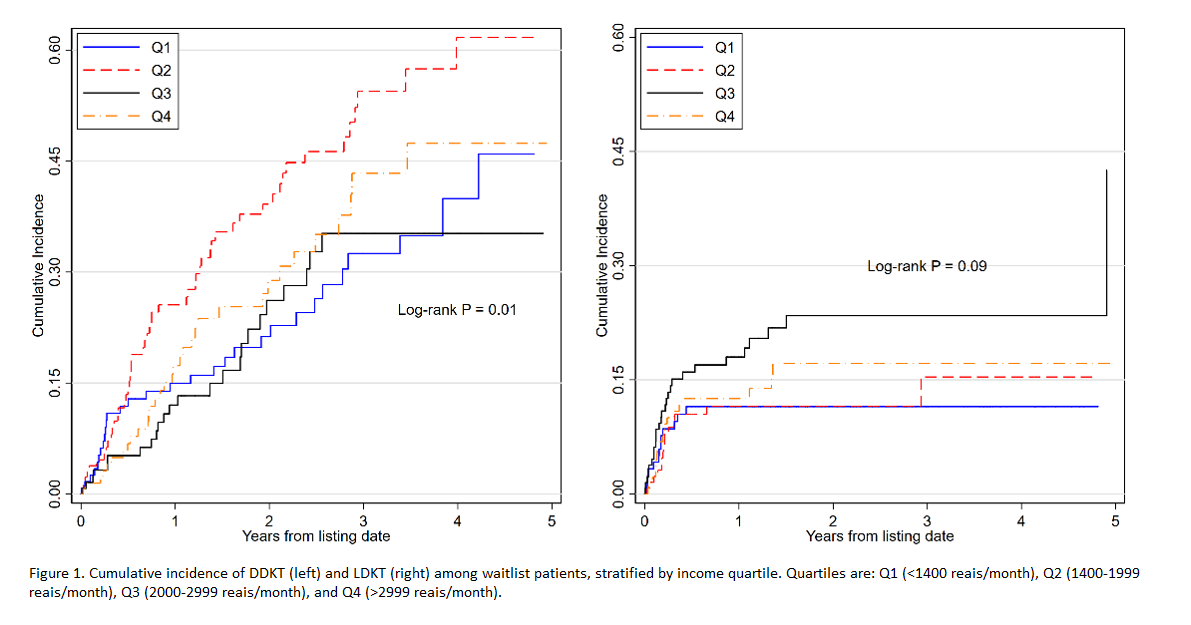Racial and Income-Based Disparities in Access to Kidney Transplantation in the Context of a Nationally-Financed Health System in Brazil
1Surgery, Johns Hopkins School of Medicine, Baltimore, MD, 2Santa Casa de Misericordia de Juiz de Fora, Juiz de Fora, Brazil
Meeting: 2019 American Transplant Congress
Abstract number: 618
Keywords: Economics, Kidney transplantation, Waiting lists
Session Information
Session Name: Concurrent Session: Non-Organ Specific: Disparities and Access to Healthcare II
Session Type: Concurrent Session
Date: Tuesday, June 4, 2019
Session Time: 4:30pm-6:00pm
 Presentation Time: 5:30pm-5:42pm
Presentation Time: 5:30pm-5:42pm
Location: Room 208
*Purpose: Changes in economic and social factors in low- and middle-income countries have led to rising burden of chronic disease. Brazil, a middle-income country with the second-largest volume of transplants in the world, has a nationally-financed healthcare system. We studied whether demographic and socioeconomic factors influence access to kidney transplantation in a Brazilian transplant center.
*Methods: We analyzed time to DDKT and LDKT among 827 KT registrants from 2012-2018 at a large transplant center in Brazil, using multivariable Cox regression adjusting for age, sex, race (White/Asian, Black, or pardo (mixed-race)), and income quartile (Q1 (lowest)-Q4 (highest)). We studied LDKT with DDKT as a competing risk and vice versa and performed a mediation analysis for race, income, and access to transplantation.
*Results: Compared to White/Asian patients, Black (aHR: 0.390.590.93, p=0.02) and pardo (aHR: 0.340.550.88, p=0.01) patients had lower access to LDKT (Table 1). These associations were partially mediated by differences in income for pardo patients (including income, aHR(pardo)=0.86). Older patients were less likely to receive LDKT (aHR: 0.630.730.85, p=<0.01). Patients in income Q3 (aHR: 1.262.484.86, p<0.01) and Q4 (aHR: 1.082.254.70, p=0.03) had substantially higher access to LDKT than those in Q1.
*Conclusions: Despite having a nationally-financed transplantation system, lower-income, black, and pardo patients face substantially lower access to LDKT than higher-income, white and Asian patients. Access to kidney transplants is largely, but not completely, mediated by income. Even in the context of public financing, disparities in access to healthcare persist in this setting.
| DDKT | LDKT | |||
| aHR | p-value | aHR | p-value | |
| White/Asian | REF | REF | ||
| Black | 0.801.081.45 | 0.62 | 0.370.590.93 | 0.02 |
| Pardo | 1.111.512.04 | 0.01 | 0.340.550.88 | 0.01 |
| Male | REF | REF | ||
| Female | 0.480.630.81 | <0.01 | 0.801.151.64 | 0.46 |
| Age at listing (per10 years) | 1.011.121.25 | 0.04 | 0.630.730.85 | <0.01 |
| DDKT | LDKT | |||
| Income Quartile | aHR | p-value | aHR | p-value |
| Q1 | REF | REF | ||
| Q2 | 1.171.842.87 | 0.01 | 0.501.072.26 | 0.87 |
| Q3 | 0.560.951.61 | 0.85 | 1.262.484.86 | 0.01 |
| Q4 | 0.791.302.15 | 0.30 | 1.082.254.70 | 0.03 |
| *Adjusted for age, race, and sex. | ||||
To cite this abstract in AMA style:
Saha A, Ferreira G, Yu Y, Waldram M, Colares V, Bastos J, Henderson M, Segev D, Massie A. Racial and Income-Based Disparities in Access to Kidney Transplantation in the Context of a Nationally-Financed Health System in Brazil [abstract]. Am J Transplant. 2019; 19 (suppl 3). https://atcmeetingabstracts.com/abstract/racial-and-income-based-disparities-in-access-to-kidney-transplantation-in-the-context-of-a-nationally-financed-health-system-in-brazil/. Accessed February 21, 2026.« Back to 2019 American Transplant Congress

